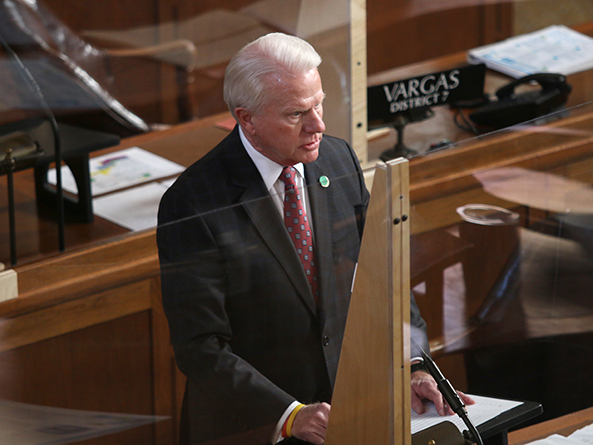Session Review: Banking, Commerce and Insurance
Digital asset management, step therapy, insurance parity and protection of vulnerable adults topped the list of issues heard by the Banking, Commerce and Insurance Committee and addressed by the Legislature this session.
LB649, introduced by Norfolk Sen. Michael Flood, creates a regulatory framework for managing digital assets in Nebraska. Under the bill, a state-chartered bank may create a digital asset division or a digital asset depository may be created under a new charter. Both will be regulated by the state Department of Banking and Finance.
Among other provisions, the bill also:
• establishes procedures for incorporation, operation, liquidation and dissolution of digital asset depository institutions;
• prohibits digital depository institutions from taking cash deposits or lending cash;
• requires a digital depository’s headquarters and office of the chief executive officer to be established in Nebraska;
• allows digital depositories to be held by a bank holding company and allows existing bank investment in such a depository;
• requires a surety bond or pledged investments and specified private insurance;
• establishes a minimum capital requirement of $10 million; and
• authorizes the director of the Department of Banking and Finance and the governor to set the assessment of digital depositories to cover administration costs.
LB649 passed on a vote of 46-2.
LB297, introduced by Omaha Sen. Brett Lindstrom, allows broker-dealers and investment advisers to hold transactions for up to 30 business days in suspected cases of exploitation of seniors and vulnerable adults.
The bill, passed on a 47-0 vote, requires broker-dealers and investment advisers to notify the Adult Protective Services Division of the state Department of Health and Human Services and the state Department of Banking and Finance within two business days in order to delay a transaction and conduct an internal review.
Senators also passed a bill that gives health care providers greater flexibility in prescribing treatment. LB337, introduced by Sen. Mark Kolterman of Seward, reforms step therapy — an insurance company practice in which a patient must fail a treatment selected by an insurance company before the company will cover a treatment originally prescribed by the patient’s health care provider.
The bill, approved 47-0, allows a provider to request a step therapy override exception and requires that the override be granted if all of the following apply:
• a provider believes a drug prescribed under step therapy will be ineffective because of the drug’s characteristics or the patient’s experience with the drug;
• a patient previously was prescribed a drug that was ineffective;
• a patient successfully is being treated by a drug prescribed by his or her provider; and
• a drug required under step therapy is contraindicated by the drug manufacturer’s prescribing information or the drug is likely to cause an adverse reaction, decrease a patient’s ability to perform daily activities or cause mental or physical harm to the patient.
LB487, introduced by La Vista Sen. John Arch, prohibits a private health insurance plan that covers mental health treatment from establishing rates, terms or conditions that place a greater financial burden on an insured for accessing treatment via telehealth.
The bill, passed 43-0, also requires that the reimbursement rate for telehealth treatment for a mental health condition be the same as the rate for a comparable treatment provided in person.
A proposal that would increase the interest rate that licensees may charge on installment loans remains on select file. LB510, introduced by Lindstrom, would raise the current interest rate cap of 24 percent on the first $1,000 borrowed and 21 percent thereafter to a single rate of 29 percent annually.
LB510 advanced from general file but was not scheduled for second-round debate.
LB20, introduced by Sen. Carol Blood of Bellevue, was advanced to general file by the committee but was not scheduled for debate. The bill would require public and private insurers not preempted by federal law to cover the expense of a self-administered hormonal contraceptive approved by the Federal Drug Administration.
A measure regarding automobile insurance remains in committee. LB602, introduced by Omaha Sen. Rich Pahls, would restrict Nebraska insurers in the use of aftermarket parts used in vehicle repair.


